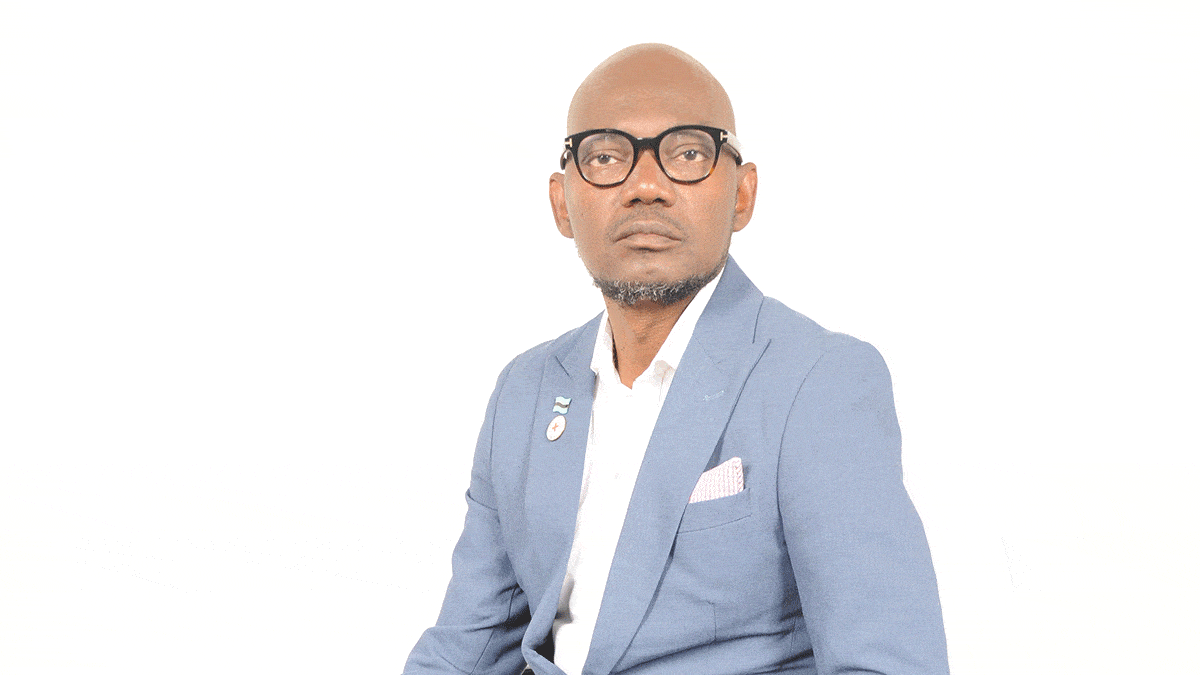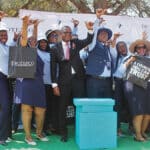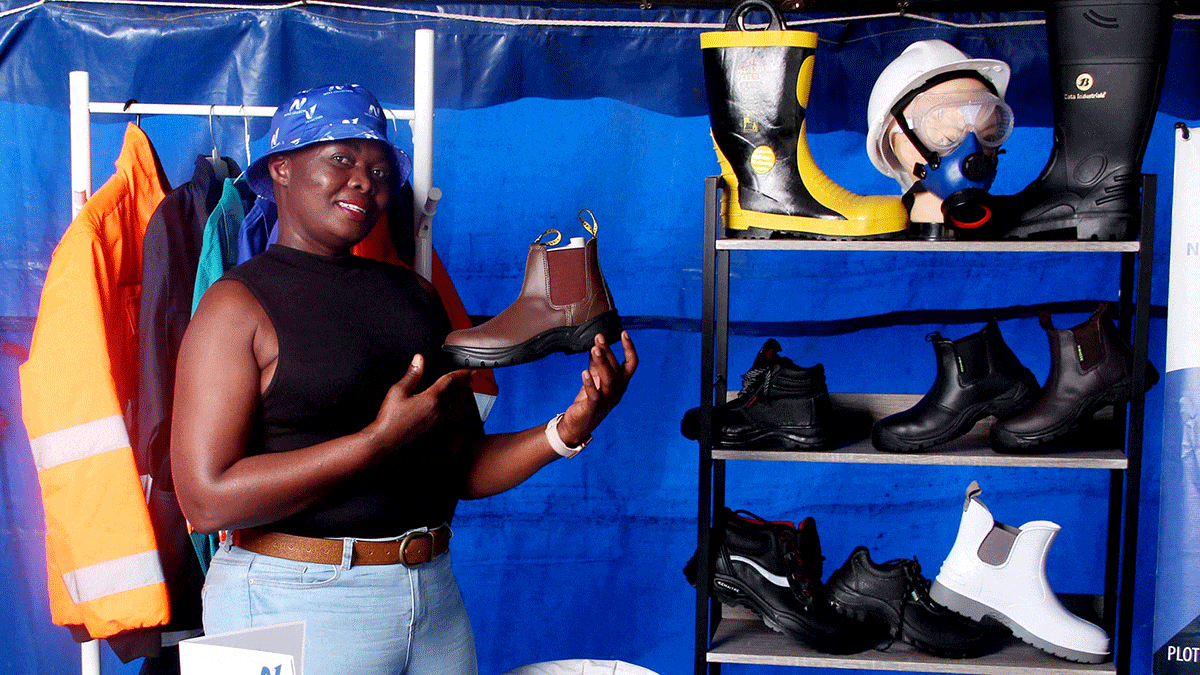The hard-working humanitarian
With a footprint dating back to 1948, the Botswana Red Cross Society (BRCS) has a long, proud history – a history that outdates the country itself!
Boasting a background steeped in the social sciences, Kutlwano Mukokomani is perfectly suited to lead this noble organistaion, which has two divisions, 10 branches and 45 sub-branches around the country.
A humanitarian at heart and a born-leader to boot, Mukokomani talks with pride about his role as the society’s Secretary-General…
Kindly introduce yourself.
I’m in my early forties and was born in Francistown. I stayed in various towns and cities during my primary and high school education, including Serowe, Francistown, Gaborone, and in Zimbabwe, where I completed my A-level education.
I guess because both my parents were graduates with Masters’ Degrees, and as kids growing up, we were always pressured to either reach their level or surpass them, hence the continuous drive for education.
Currently, I am also pursuing a Master’s Degree in Humanitarian Leadership from the University of Lucerne in Switzerland. I hold an MBA in Operations and Decisions Management, a Bachelor of Social Science Degree in Economics, a Diploma in Human Resources Management, and an Advance Certificate in Project Management.
Wow, quite the academic profile! What about your professional experience?
I started having experience in the work environment while I was still doing year 1 of my Bachelor of Social Science at the University of Botswana. I had joined the Student Empowerment Club at UB, whose main purpose was to empower students and expose them to the working environment while they are still at school.
Later on, during my 4th year at UB, I joined the Mupane Gold Mine in Francistown under the Human Resource Department. After graduating from UB in 2005, I was fortunate to land a job with a USAID-funded Project (Integrated River Basin Management Project – IRBM).
So when did you join the Red Cross?
I officially joined Botswana Red Cross in November of 2018. I would want to confess that prior to joining, I did not know much about the organisation. I had always thought it was an NGO, but later on, I found out it was actually an organisation formed by an Act of Parliament and that it exists in 192 countries worldwide.
I guess that made me more interested in the organisation, and I vowed to work even harder to raise the bar at Botswana Red Cross, so we are at par with other Red Cross and Red Crescent societies worldwide.
And what does your day-to-day role involve?
As the Secretary-General, I am also the CEO of the organisation. These roles are not easy because yours is to ensure that everything runs smoothly and brings sustainability to the organisation amid global and local challenges in the humanitarian space.
However, my day-to-day includes overall management of Botswana Red Cross Society resources, stakeholders and partners and also usher strategic guidance and leadership to all staff in implementing the Red Cross mandate.
As a donor-driven organisation, ensuring proper compliance and adherence to donor requirements is imperative; hence one of my key daily jobs is to foster and instill organisational adherence and compliance to regulations and policies. The Red Cross has a membership and volunteer base.
You’ve been appointed to the Compliance and Mediation Committee (CMC) of the International Federation of the Red Cross. Tell us more…
The CMC comprises a 13-member committee appointed in their personal capacity after a thorough assessment of their qualifications and experience. The Election Committee then presents their names at the General Assembly for appointments.
I’m therefore pleased to have gone through this vigorous process and emerged successfully by getting this very important appointment for the first time in Botswana and the Southern Africa region. My role in the committee is to offer mediation and help resolve breaches among the world’s 192 Red Cross National Societies. This is a four-year appointment.
Congratulations on that! Briefly explain the BRCS’s mandate?
The Botswana Red Cross Society was formed to be an auxiliary to Government on humanitarian issues, mainly health, social services, disaster management and first aid Services. Our mandate is to close the gaps that the government might have left behind. We exist to complement government efforts where need be.
It is important for people to know that the Botswana Red Cross is not a non-governmental organisation. However, it is a Civil Society Organisation constituted by the Act of Parliament and International law because our government is a party to the Geneva Conventions. Throughout the years, we have been assisting the most vulnerable people in our communities, especially those at far-to-reach areas, through our many interventions.
These include: community-based first aid, physiotherapy services for people with disabilities, health services, livelihood and food insecurity initiatives, camp management services for the refugees, and disaster preparedness and management amongst our many programs.
What was your roadmap when you joined the organisation?
When I joined, I realised there was much to do. The organisation needed a transformation in order for it to be credible, trustworthy, innovative and sustainable.
First, we had to develop and initiate internal systems and policies to guide our actions. This was to ensure that we improve on our credibility and integrity issues and be appealing to donors.
Secondly, we had to forge strategic partnerships to help rejuvenate our community responses; this allowed us to be impactful in our response and move towards sustainability. Lastly, we had to be innovative and agile in delivering quality humanitarian services. This will ensure we maintain and retain the trust of our beneficiaries and donors and hence become a humanitarian player of choice in Botswana.
What projects are you currently working on?
We kick-started the year with the county-wide Polio vaccination campaign, where we saw our volunteers and workers, in collaboration with Ministry of Health, deliver a successful polio vaccination for children under the age of seven.
The Botswana Red Cross is an implementing partner for the African Union (AU) Africa CDC Savings Lives and Livelihood (SLL) project. This is a regional project that we are conducting within the 10 Southern African countries to create demand for Covid-19 vaccines and have at least 70 percent of the African population vaccinated by 2023.
Other ongoing project includes the food security project, where we give food baskets to selected households.
How prepared is BRCS to cater for humanitarian needs should a disaster occur?
With over 10, 000 volunteers and 3, 000 members across towns and villages in Botswana, we always stand ready for any unprecedented eventuality that might arise. Most of our volunteers are highly knowledgeable and trained in Disaster Preparedness, Disaster Camp Management, and Psycho-Social First Aid; these are some of the critical skills needed in case of a disaster. Our volunteers form part of the village response teams within their communities, and at any given time when a disaster hits, the disaster teams are activated and respond accordingly.
However, it is also important to note that there has been an increase in demand for disaster relief equipment. The National Society only keeps a limited stock in storage, and this sometimes compromises our response to disasters due to a shortage of equipment and stock. I call on all partners and the Government to consider equipping the National Society with the required resources; this will enable it always to stand ready for any disaster.
What other support does BRCS need?
As an auxiliary to Government, firstly, the Red Cross must get buy-in from all ministries and departments and agree on a clear mandate on how the Red Cross will complement the Government. With its many volunteers and technical support from its international partners, the Botswana Red Cross’s services to communities are always free. However, with sustainability becoming a challenge, increased subvention and unsolicited project funding should be availed to the Red Cross to enable its survival and safeguard its mandate as a humanitarian aid organisation. Donors, corporates and organisations must partner with the Botswana Red Cross and help us deliver humanitarian services and safeguard humanity for the future.
Apart from sustainability, what other challenges do you face?
The statutory Legislation of the Red Cross is old it has been overtaken by time and events. This has brought regulatory hiccups and caused delays in some of our operations, especially in disaster responses. Getting urgent relief material from abroad has sometimes been a challenge – this is also linked to the legislation gaps that exist in the Act. Donor fatigue has also affected the flow of our funding.
Any plans for the Act to be updated then?
The Botswana Red Cross Act of 1968 is indeed under review. As you may be aware, Covid-19 has changed how most governments worldwide would respond to future disasters and pandemics. There was a need to look at the response to disasters and humanitarian aid through a harmonized and integrated approach; hence an urgent need to review relevant Acts, especially humanitarian and disaster management Acts such as the Red Cross Act.
We believe the review will assist the Red Cross to operationalize its mandate without any hindrance. We are hopeful that this process will be completed before the end of 2024, and we believe that with the ACT completed, it will give the Botswana Red Cross the much-needed boost to tackle any humanitarian challenges that come its way.
Speaking of the pandemic, what was the organisation’s role during Covid-19?
The Red Cross’s role in the Covid-19 response was multifaceted. We formed part of the village response teams at villages. Our workers and volunteers also formed part of the district response teams, and we had officers representing us at the national emergency centre and the Presidential Task Force. The involvement of the Red Cross in the national response structures for Covid was to ensure that the community voice is not left behind.
During the response, we had more than 3, 000 of our volunteers deployed at DHMTs and port health, clinics and the national laboratory lab for contact tracing, data entry and minimal non-clinical work. The Botswana Red Cross also supported some families, including migrants, with food baskets during lockdowns.
Away from your hectic work schedule how do you relax?
During my free time, I spend time with my family and do minimal activities at the farm. Fortunately, my dad has left us with a good farming background, and I am slowly following in his footsteps. Perhaps one day, in my little corner, I may be able to also contribute to feeding the nation.
PERSONAL PROFILE
FULL NAMES: Kutlwano Mukokomani
DOB: 27 July
POB: Francistown
MARITAL STATUS: Married
FAV MEAL: Papa and Seswaa
FAV DRINK: Coca Cola
HOLIDAY DESTINATION: It’s always Kasane
FAV TEAMS: Arsenal and Mamelodi Sundowns














